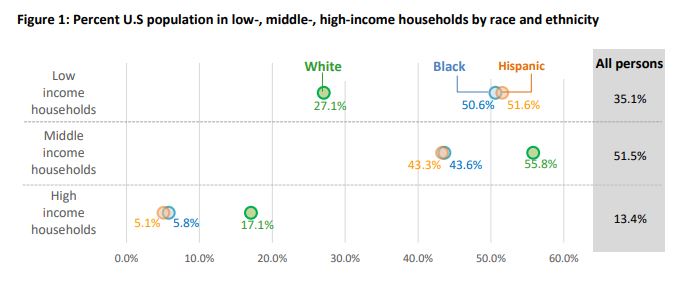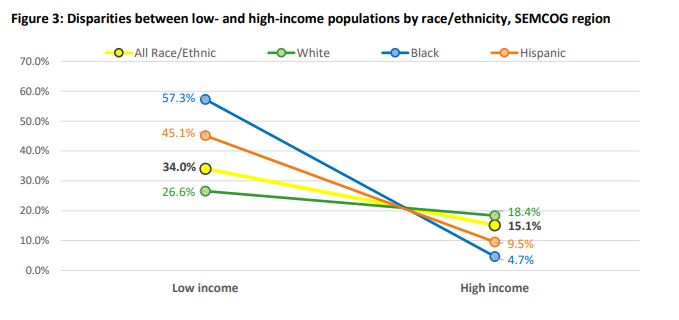Study Says Economic Recovery Disproportionately Benefitted Wealthier, White Households
A regional government group is concerned that Blacks and Hispanics may fare worse when the economy recovers from pandemic.

The COVID-19 pandemic ended more than a decade of economic growth in the United States. From the end of the last recession in 2009 to the early part of 2020, most Americans benefited from that expansion. But research shows that a rising tide does not necessarily lift all boats.
The University of Michigan and the Southeast Michigan Council of Governments (SEMCOG) have been looking at household income trends over the last decade. Their question: Did the recovery from the Great Recession result in shared prosperity across different racial and ethnic populations?
The short answer is no. Read the report here.
Click on the player above to hear Xuan Liu’s conversation with WDET’s Pat Batcheller about income disparities
Xuan Liu is SEMCOG’s research director. He says African Americans and Hispanics were disproportionately left behind.
“If we look at the total population, 13.4% are ‘high-income,'” Liu says. “But for Black people, it’s only 5.8%, and for Hispanics it’s 5.1%.”
“There’s greater disproportional impact among low-skilled, low-wage workers than the last recession, and these workers are disproportionately people of color.” — Xuan Liu, SEMCOG
By contrast, 17% of white people were in the high-income category.
The disparities exist at the other end of the spectrum, too.
“For the nation as a whole, nearly a third (35%) are in the low-income category,” Liu says. “But it’s more than 50% for Blacks and Hispanics.” 27% of white households were low-income.

The research shows the income disparities are even wider in SEMCOG’s seven-county region, which includes Livingston, Macomb, Monroe, Oakland, St. Clair, Washtenaw and Wayne counties. The data show nearly three-fourths (73.4%) of Black children under age 18 live in low-income households, which exceeds the national average of almost 65%. Detroit has the third-highest share of low-income Black residents (66.3%) nationwide, behind Minneapolis and Miami. Only about 3% of the city’s Black population lived in high-income households.

Liu says there are many reasons why these gaps exist, including education.
“Today’s economy requires highly-skilled workers with more education,” he says. “There’s such a disparity of opportunities and other factors such as job training.”
The research began in 2019, when the economy was booming, but is not complete. Liu says SEMCOG is sharing some of the findings now because they’re timely and relevant to the economic upheaval caused by the pandemic — and to the nationwide protests against racial and social inequity.
What does it mean for the next recovery?
“We started the study, and then the pandemic hit, and then the death of George Floyd,” Liu says, referring to the Black Minneapolis man killed by police. “There’s a lot of discussion on social equity, racial equity, and we have that in our study. We think it’s important to share the information we have.”
Liu says he’s concerned that the new recession could be worse for Blacks and Hispanics than the last one.
“This time, I think the data show there’s greater disproportional impact among low-skilled, low-wage workers than the last recession, and these workers are disproportionately people of color,” he says.
Liu says SEMCOG will use the research to develop a regional economic strategy to address those income gaps.
Trusted, accurate, up-to-date
WDET is here to keep you informed on essential information, news and resources related to COVID-19.
This is a stressful, insecure time for many. So it’s more important than ever for you, our listeners and readers, who are able to donate to keep supporting WDET’s mission. Please make a gift today.
